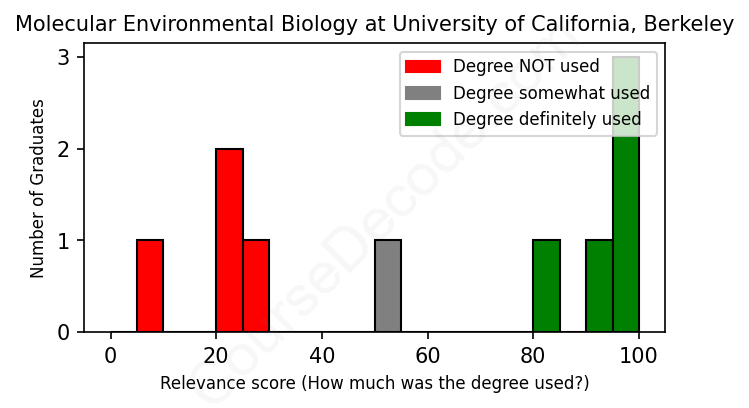
First, some facts. Of the Molecular Environmental Biology graduates from University of California, Berkeley we've analyzed , here's how many have used (or NOT used) their degree in their career:

These are estimates based on AI analysis of 10 LinkedIn profiles (see below).
The verdict? Below average. Overall, with an average relevance score of 60%, Molecular Environmental Biology graduates from University of California, Berkeley have a lower likelihood (-7%) of finding work in this field compared to the average graduate across all fields:
And for comparison, here's the chart for all profiles we've looked at across all degrees.
Also, after graduating, 50% of these graduates have pursued further education other than another Bachelor's degree (such as a Masters degree or other), compared to the average across all profiles of 35%. This suggests you may need more than just a Bachelors degree to be competitive as a Molecular Environmental Biology graduate.
See the details:
|
Relevance score: 24% We think this person has NOT gone into a career related to their degree. We think this person has NOT gone into a career related to their degree.
DEGREE INFOGraduated in 2013 from University of California, Berkeley with a Bachelor of Science - BS in Molecular Environmental Biology. Also pursued further education since (see below). JOB HISTORY SINCE GRADUATIONInsurance Enrollment Specialist Mission City Community Network Jan 2014 - 2015 Health Education Coordinator  Mission City Community Network 2014 - Aug 2015 Program Coordinator  Mission City Community Network Apr 2015 - Aug 2015 Administrative Assistant  University of Southern California Nov 2017 - Jul 2018 Customer Service Representative  University of Southern California Aug 2015 - Jun 2020 Project Coordinator  University of Southern California Jun 2020 - Apr 2021 Project Specialist  University of Southern California Apr 2021 - Present FURTHER DEGREES DONE SINCE GRADUATINGMaster of Public Health - MPHUniversity of Southern California 2019 - 2021 ABOUTNo information provided. |
The top 10 most common jobs done by the graduates we've analyzed (ranked most common to least) are:
After checking out the job history of graduates from UC Berkeley with a degree in Molecular Environmental Biology, it’s clear that a lot of them found themselves in the health and clinical fields. Many ended up working as clinical lab scientists, which makes sense since their degree prepares them well for roles that require biological and lab skills. These roles typically involve direct application of what they learned, and graduates in these jobs are definitely using their education in a relevant way. Just look at the numerous Clinical Laboratory Scientist positions; they really align with the core aspects of their molecular training.
However, it's also evident that not all paths taken are closely related to their degree. Many grads have taken on positions in administration, education, or customer service, which seem more about general skills than the specialized knowledge from their studies. Jobs like Insurance Enrollment Specialist or Administrative Assistant don’t utilize their environmental biology expertise at all. So, while there are significant opportunities in labs and research that relate back to their education, there are also a number of roles that deviate quite a bit from the molecular environmental biology focus, indicating that graduates are stretching their degrees in various directions. It’s a mixed bag, really!
Here is a visual representation of the most common words in job titles for Molecular Environmental Biology graduates (this is across all Molecular Environmental Biology graduates we've analyzed, not just those who went to University of California, Berkeley):

Graduates from the Molecular Environmental Biology program at UC Berkeley seem to have a pretty diverse set of career paths, but many do find their way into roles related to healthcare and scientific research. For their first jobs after graduation, it looks like many of them gravitate towards internships or entry-level positions in healthcare or community health organizations, often focusing on areas like research assistance or health coordination. For instance, some began as interns or laboratory assistants, which makes sense given their educational background. They likely want to gain relevant experience while figuring out their long-term career goals.
Fast forward five years or so, and you'll see a mix of graduates making notable strides in their fields. Many move up the ladder into more specialized roles, particularly in clinical laboratory science and clinical settings. For example, some graduates transitioned from research technician roles to being senior clinical lab scientists or even family medicine physicians. However, others have taken paths that seem somewhat less related to their degree, like administrative or project coordination positions. Overall, while there are clear examples of graduates leveraging their degree into fulfilling and relevant careers, some have ended up in roles that might not directly relate to Molecular Environmental Biology—even if they're still contributing to healthcare in some way. So, it's a bit of a mixed bag, but definitely a solid foundation for those leaning towards science or health professions!
A Bachelor’s degree in Molecular Environmental Biology at UC Berkeley is pretty challenging, but it can be super rewarding if you're passionate about the subject. You'll be diving into some complex topics that blend molecular biology, ecology, and environmental science, which means you'll have to tackle a lot of detailed coursework and lab work. The professors can be tough, and the workload can feel overwhelming at times, especially if you're not used to the pace of a school like Berkeley. However, if you’re dedicated and enjoy exploring the interactions between living organisms and their environments, you might find it all worth it. So, while it’s definitely on the harder side compared to more laid-back majors, it’s doable with the right mindset and support!
Most commonly, in the LinkedIn profiles we've looked at, it takes people 4 years to finish a Bachelor degree in Molecular Environmental Biology.
Looking at the job paths of these Molecular Environmental Biology grads from UC Berkeley, it seems like they’ve had a pretty decent variety in their careers, but the money doesn’t seem to be that great across the board—especially for the earlier positions. For example, starting out with roles like clinical lab positions and community health coordinators might not have raked in huge salaries, though things definitely pick up for some, like the Family Medicine Physician who likely makes a solid income now. The dentist from the 2011 group probably makes a decent living, given the field, but others seem to be hanging in jobs that might pay more on the lower end of the spectrum. Overall, while there's potential for good pay with some of their roles, many folks started with positions that likely paid less, meaning it's a mixed bag when it comes to making “decent money.”
Here are all colleges offering a Bachelor degree in Molecular Environmental Biology (ordered by the average relevance score of their Molecular Environmental Biology graduates, best to worst) where we have analyzed at least 10 of their graduates:
| College | Score | Count |
|---|---|---|
 University of California, Berkeley University of California, Berkeley
|
60 | 10 |